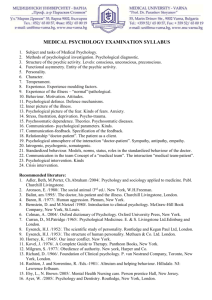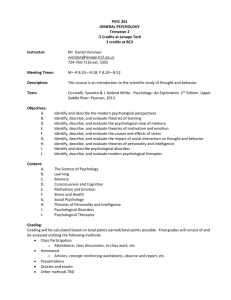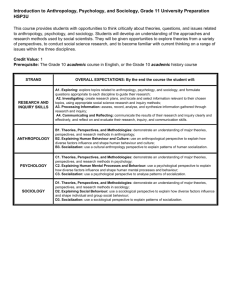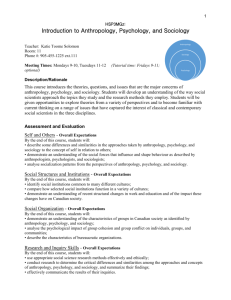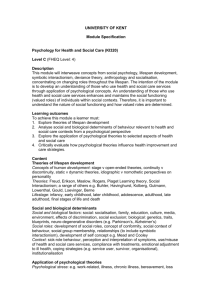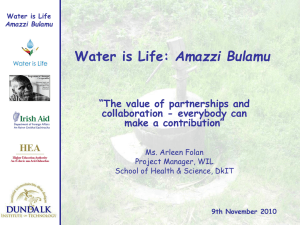FOM 1213 FOUNDATION OF BEHAVIORAL SCIENCES
advertisement
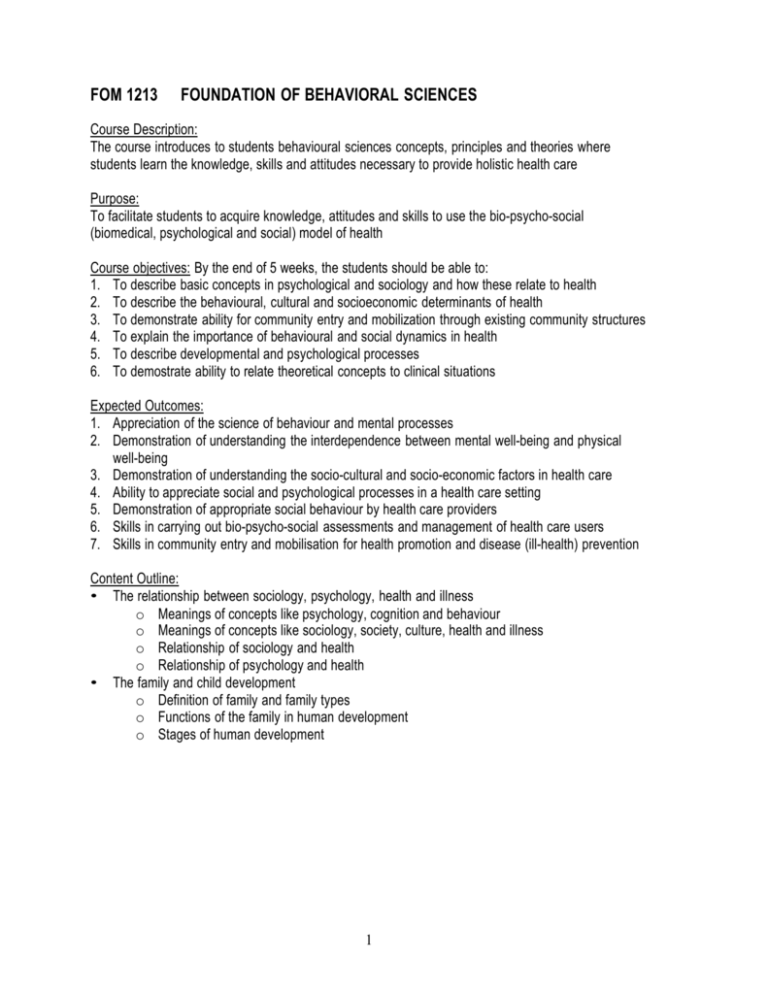
FOM 1213 FOUNDATION OF BEHAVIORAL SCIENCES Course Description: The course introduces to students behavioural sciences concepts, principles and theories where students learn the knowledge, skills and attitudes necessary to provide holistic health care Purpose: To facilitate students to acquire knowledge, attitudes and skills to use the bio-psycho-social (biomedical, psychological and social) model of health Course objectives: By the end of 5 weeks, the students should be able to: 1. To describe basic concepts in psychological and sociology and how these relate to health 2. To describe the behavioural, cultural and socioeconomic determinants of health 3. To demonstrate ability for community entry and mobilization through existing community structures 4. To explain the importance of behavioural and social dynamics in health 5. To describe developmental and psychological processes 6. To demostrate ability to relate theoretical concepts to clinical situations Expected Outcomes: 1. Appreciation of the science of behaviour and mental processes 2. Demonstration of understanding the interdependence between mental well-being and physical well-being 3. Demonstration of understanding the socio-cultural and socio-economic factors in health care 4. Ability to appreciate social and psychological processes in a health care setting 5. Demonstration of appropriate social behaviour by health care providers 6. Skills in carrying out bio-psycho-social assessments and management of health care users 7. Skills in community entry and mobilisation for health promotion and disease (ill-health) prevention Content Outline: • The relationship between sociology, psychology, health and illness o Meanings of concepts like psychology, cognition and behaviour o Meanings of concepts like sociology, society, culture, health and illness o Relationship of sociology and health o Relationship of psychology and health • The family and child development o Definition of family and family types o Functions of the family in human development o Stages of human development 1 • • • o Psychological theories of human development (Erik Erickson, Jean Piaget, Sigmund Freud and Kohlberg) Socialization, perception, gender and gender relations o The socialization process (aims, agents, levels/types) o Cultural Norms and cultural values o Gender, Gender roles and Gender-based violence o Learning (theories) o Perception Consciousness, motivation, memory, emotion and medical pluralism o Levels of consciousness o Altered states of consciousness o Medical pluralism o Alternative sources of health care o Motivation (theories) o Emotion (theories) o Process of memory o Stages of memory Community entry and mobilization o The concept of cultural shock o The concept of emotional attachment o Belief systems o Factors affecting health seeking behaviour o Explanatory models in health seeking behaviour o Role of community and opinion leaders in community health promotion o Factors affecting access to health care o Steps in community entry and mobilisation Assessment Methods: Students shall be assessed through formative and summative means. These shall include: a) Continuous assessment during the entire problem based learning sessions. This permits immediate feedback to every student. b) An end of course progressive examination consisting of: • Extended Matching Question Items • Modified Essay Questions (MEQ) The two assessments will be added together to contribute 40% of the final mark for the course c) An end of the block examination (summative) consisting of: • Extended Matching Question Items • Modified Essay Questions (MEQ) This will contribute 60% of the final mark for the course Delivery Methods: Over-view Lectures, Small Tutorial sessions with a tutor, Expert resource seminars, wrap up seminars and clinical exposures Duration of the Course: Five weeks, 75 CH, 5 CU 2 Resources and Infrastructure available: Library (in the department of psychiatry and Albert Cook), Tutorial rooms, Computer services and internet, Content experts, Patients and the teaching hospital, Competent Guest Lecturers and the communities adjacent to the teaching hospital Teaching staff Name 1. Dr. Elilialia Okello 2. Mr. Andrew Turiho 3. Dr. Wilson Muhwezi 4. Mr. Henry Oboke 5. Ms. Janet Nakigudde Qualifications B.A (Sociology); M.A (Medical Sociology); PhD (Medical Anthropology) BA. (Social Work); MSC (Social work) B.A (Social work); MPhil (Health Promotion) PhD (Social Medicine) BSc, MSc (Clinical Psychology) Dip (Education), BA (Psychology); MSc Clinical Psychology 3 Employer MUK Full time MUK MUK Full time Full time MUK MUK Part time Full time


